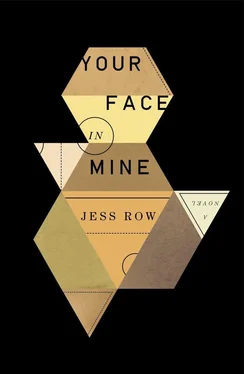And he said, You really want to know?
Yeah. I really want to know.
You’re graduating high school, right? You have a job?
That was it for me. Curiosity killed the cat.
Before him I’d never really known a white criminal. Of course I’d known dealers, or at least knew of them, around the neighborhood when I was younger. But Seymour didn’t do anything at the street level. He didn’t have turf. His dad was some kind of banker at Alex Brown; he grew up in Roland Park, got kicked out of Boys’ Latin and then Dartmouth for dealing. Then his family cut him off, and he basically went to ground, went AWOL, and climbed up the ladder of the business — developed his own sources, his own clientele, all up and down 95. Maine to Florida, the Appalachian Trail of weed. I must have smoked two or three hundred different varieties with him. He got product from everywhere — Colombia, Peru, Thailand, Afghanistan, Nepal, Jamaica, Humboldt, Salt Spring Island, Paraguay. He carried around metal suitcases full of samples in the back of his Saab, and would go around having tastings, four or five stockbrokers or doctors or what have you at a time. Developing customer profiles he wrote up on his PowerBook. With him it was all classy, down to the way he dressed, super-put-together, all blacks and grays, Banana Republic style.
And so a month after I met him he had me signed up as a courier working the New York — to — Miami route. Trying to crack the distribution nut, break into the regional business. We drove these vans that old Cuban ladies took back and forth, visiting family. Pick up the abuelas on 125th Street and Lex, stop overnight at a Motel 6 in Richmond, drive all the next day and night to Miami, do the drop-off, pick up more abuelas on Calle Ocho, stop at a Motel 6 in Charlotte, same time, same station, and when you get back to New York take the van uptown to Inwood, leave it in this garage overnight. The chassis, the floorboards, the hood, the wheel wells — we could carry five hundred pounds and all it cost was a little extra gas money. Kept it at a cool 67 the whole way. Made sure the tires were solid, tested the lights, did everything to make sure we never had a stop. Because the thing was — no matter how hard we tried, how many air fresheners and pounds of coffee — you could still smell it. The abuelas would get all giggly before we stopped for pee breaks. You can’t have all that sticky bud in an enclosed space and not smell it. Triple-bagged Ziplocs and all. I would do three runs and then take the bus back to Baltimore and have two weeks off. A thousand dollars a run. Tax-free. It was a genius operation. White kids saving money for college; old Cuban ladies visiting their sisters; never had a cop give me a second look.
So anyway: that went on for two years. The entire time Dad was sick. Easy work, easy money. Then — overnight — the whole thing disappeared. The vans, the company, the garage up in Inwood: poof! Never knew why. Seymour thought they’d found an easier route. Shipping containers, maybe even commercial air. There were FedEx people involved in those days, before the company came down hard on side deals. All those big planes carried a little extra weight. In any case, for six months, I was shit out of luck, work-wise. Seymour had left town; I didn’t know if he’d ever be back. I’d saved a lot of my cash, and of course I had the house outright.
So what did I do? I went to school. UMBC. Econ 120, Accounting 120, Con Law, and “Introduction to Holocaust Literature.” I registered late, and all the intro English courses were full. So instead I had Dr. Klefkowitz in this little tiny room with eight other kids. Klefkowitz must have been at least seventy. And he had the numbers tattooed on his arm. Never said a thing about it, but he didn’t hide it, either. He looked at me as I was leaving on the first day — I was the last one out of the room — and said, excuse me, Martin Lipkin, may I ask, you are a Jew?
My father was Jewish, I told him, my mother wasn’t, as far as I know, I never went to synagogue, never had a bar mitzvah. I know a lot of Jews. I don’t know. Am I a Jew?
He shrugged. You’re asking me? Don’t ask me. Ask a rabbi.
I don’t know any rabbis.
Well, he said, maybe you’ll read these books and feel something.
We read — who did we read first? Primo Levi. Elie Wiesel. Borowski. Danilo Kiš. But the best one was this guy I’d never heard of, Bruno Schulz. Who wasn’t even really a Holocaust writer at all. I mean, yes, he was killed by a Nazi. But everything we have that he wrote, just two little books of short stories, was written in the Thirties, before the Germans invaded Poland. He never wrote a thing about the Nazis. All his work was about his childhood and his family. And his debates with God.
I’m not much of a reader. God knows. I mean, since high school, when that was my job, when I read everything. My adult store of knowledge, like Seymour used to say, is all from the school of fall down six times, get up seven. But there was this one story by Bruno Schulz that changed my entire life. Really not the whole story. Just one page. For years I had it taped to the wall in my bedroom. Then I had a guy at Kinko’s do it in tiny print and laminate it on a card. So, okay: the story is called “Tailor’s Dummies.” The father is this older, crazy guy, a hermit, like Dad, not incidentally, who has this thing about mannequins. Dummies. He sees life in these artificial things, these, you know, made-up forms of human beings. That’s his project. This is the father talking, giving his treatise on dummies and what they mean. I had to order a new copy on Amazon; it just arrived yesterday. Hold on, I’ll get the page.
“The Demiurge,” said my father [MW reading aloud], “has had no monopoly of creation, for creation is the privilege of all spirits. Matter has been given infinite fertility, inexhaustible vitality and, at the same time, a seductive power of temptation which invites us to create as well. In the depth of matter, indistinct smiles are shaped, tensions build up, attempts at form appear. The whole of matter pulsates with infinite possibilities which send dull shivers through it. Waiting for the life-giving breath of the spirit, it is endlessly in motion. It entices us with a thousand sweet, soft, round shapes which it blindly dreams up within itself.
“Deprived of all initiative, indulgently acquiescent, pliable like a woman, submissive to every impulse, it is a territory outside any law, open to all kinds of charlatans and dilettanti, a domain of abuses and of dubious demiurgical manipulations. Matter is the most passive and most defenseless essence in cosmos. Anyone can mold it and shape it; it obeys everybody. All attempts at organizing matter are transient and temporary, easy to reverse and to dissolve. There is no evil in reducing life to other and newer forms. Homicide is not a sin. It is sometimes a necessary violence on resistant and ossified forms of existence which have ceased to be amusing. In the interests of an important and fascinating experiment, it can even become meritorious. Here is the starting point of a new apologia for sadism.
“My father never tired of glorifying this extraordinary element matter. ‘There is no dead matter,’ he taught us, ‘lifelessness is only a disguise behind which hide unknown forms of life. The range of these forms is infinite and their shades and nuances limitless. The Demiurge was in possession of important and interesting creative recipes. Thanks to them he created a multiplicity of species, which renew themselves by their own devices. No one knows whether these recipes will ever be reconstructed. But this is unnecessary, because even if the classical methods of creation should prove inaccessible for evermore, there still remain some illegal methods, an infinity of heretical and criminal methods.’”
Читать дальше












